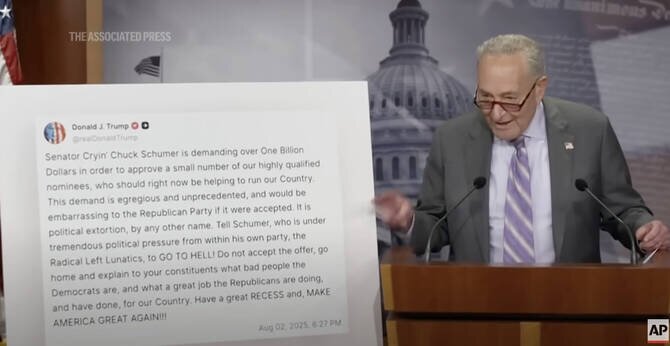
Senate Democrats Resist Trump's Nominees Amid Partisan Standoff
US Senate Minority Leader Chuck Schumer criticizes President Donald Trump for attempting to 'steamroll' the Senate.
In a heated exchange between US Senate Minority Leader Chuck Schumer and President Donald Trump, the Senate adjourned for recess until September without reaching any agreements on nominee confirmations.
The standoff marks an escalation in partisan obstruction over executive branch and judicial nominees.
Schumer accused Trump of attempting to 'steamroll' the Senate by trying to push through his historically unqualified nominees.
In response, Trump tweeted that Schumer should 'go to hell,' a remark that has further strained relations between the two parties.
The Senate Majority Leader, John Thune, suggested revising Senate rules to facilitate faster confirmations but acknowledged the difficulty of achieving bipartisan support.The ongoing dispute reflects decades-long escalation by both parties in obstructing each other's executive and judicial nominees.
Recent changes to Senate rules have been made incrementally over the years to expedite confirmations and reduce their bipartisan nature.
Democrats blocked President Barack Obama's judicial picks in 2013, leading to a rule change for lower court nominations, while Republicans followed suit for Supreme Court nominees in 2017.The impasse comes as both parties seek to influence the composition of the federal judiciary during Trump's presidency.
Despite extended Senate sessions and longer hours this year, Democrats have resisted confirming Trump's nominees without concessions on spending cuts, notably foreign aid reversals.
The inability to secure a deal has led Republicans to contemplate altering Senate rules when they reconvene in September.Schumer emphasized that changing rules to favor one party's interests undermines the democratic process and serves only to disenfranchise American citizens.
He argued that legislation should be addressed through cooperative negotiations rather than rule changes.
Thune, however, maintains that the current nomination process is 'broken' and suggests robust discussions on potential reforms.The Senate's deadlock has significant implications for the governance of the country, as both parties continue to leverage their power over nominations to influence policy outcomes.
As the standoff unfolds, it remains to be seen whether further rule changes or continued partisan resistance will characterize the remainder of Trump's presidency.
The standoff marks an escalation in partisan obstruction over executive branch and judicial nominees.
Schumer accused Trump of attempting to 'steamroll' the Senate by trying to push through his historically unqualified nominees.
In response, Trump tweeted that Schumer should 'go to hell,' a remark that has further strained relations between the two parties.
The Senate Majority Leader, John Thune, suggested revising Senate rules to facilitate faster confirmations but acknowledged the difficulty of achieving bipartisan support.The ongoing dispute reflects decades-long escalation by both parties in obstructing each other's executive and judicial nominees.
Recent changes to Senate rules have been made incrementally over the years to expedite confirmations and reduce their bipartisan nature.
Democrats blocked President Barack Obama's judicial picks in 2013, leading to a rule change for lower court nominations, while Republicans followed suit for Supreme Court nominees in 2017.The impasse comes as both parties seek to influence the composition of the federal judiciary during Trump's presidency.
Despite extended Senate sessions and longer hours this year, Democrats have resisted confirming Trump's nominees without concessions on spending cuts, notably foreign aid reversals.
The inability to secure a deal has led Republicans to contemplate altering Senate rules when they reconvene in September.Schumer emphasized that changing rules to favor one party's interests undermines the democratic process and serves only to disenfranchise American citizens.
He argued that legislation should be addressed through cooperative negotiations rather than rule changes.
Thune, however, maintains that the current nomination process is 'broken' and suggests robust discussions on potential reforms.The Senate's deadlock has significant implications for the governance of the country, as both parties continue to leverage their power over nominations to influence policy outcomes.
As the standoff unfolds, it remains to be seen whether further rule changes or continued partisan resistance will characterize the remainder of Trump's presidency.










